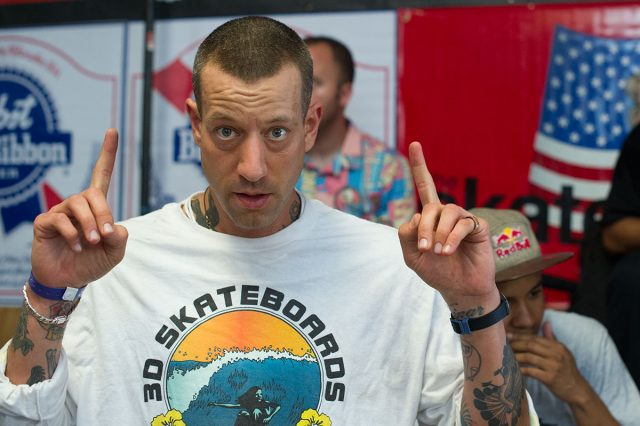
A brave and monumental moment in skateboarding history.
Retired skateboarder Brian Anderson, who infamously won both Thrasher‘s prestigious Skater of the Year award and a World Cup of Skateboarding title back in 1999, has come out as gay.
The former Toy Machine and Girl pro and the founder of 3D Skateboarders is the subject of a Vice Sports documentary hosted and directed by skate filmographer Giovani Reda, who asked B.A. about his experience as a homosexual man in the skateboarding community and why he took his time before coming out publicly. According to Anderson, he had previously spoken to friends and colleagues, including Bianca Chandon founder Alex Olson and Thrasher editor Jake Phelps about his lifestyle in private, but had been too shook to address the issue publicly until he had retired and withdrawn from the community’s spotlight. In peak Phelper form, the editor apparently responded to the news with the following: “Gay like what? Who cares—what does that matter—fuck your sexual crisis! Who cares?”

This is mean as no slight towards Phelps, but people should care about BA’s brave decision to come out and here’s why: Skateboarding—like most sports—is a hyper-masculine space. Alex Olson has spoken out in the past about how he had felt that the skate community had labeled him feminine for his fascinations with ’70s fashion and for having an affinity for disco music. The alienation of behaviors that are perceived as outside of the masculine ideal homogenizes the skating community while also keeping gay skaters closeted for longer. Toy Machine founder Ed Templeton was elated that his team was the first company to promote a woman, Elissa Steamer, to its professional roster and would’ve gladly pushed Anderson as the sport’s first prominent gay figure (lesser riders had come out to little or not fanfare in the past). As Guy Mariano says late in the documentary, Anderson has already been embraced and uplifted as a superhero for and by the skateboarding community. His decision to come out—whether privately or publicly—has had little effect on his peers’ opinions of him and they hope his fans and admirers feel the same.

Anderson’s style both on and off the board has always been one of sureness and defiance—whether it be walking the runway barefoot or infamously stomping a front blunt down Hubba Hideout, he has never been one to shy away, to pull back. Anderson even attributes much of his reckless abandon on his board to his internalized shame and pent-up sexual frustration. His decision to open up to Reda and to a broader audience marks a significant moment in skateboarding history, as it normalizes an entire lifestyle for upcoming generations of gay skateboarders who may not have known that one of their idols was just like them, while also forcing the skate community to confront homophobia and bigotry head-on.
Congratulations, BA.







